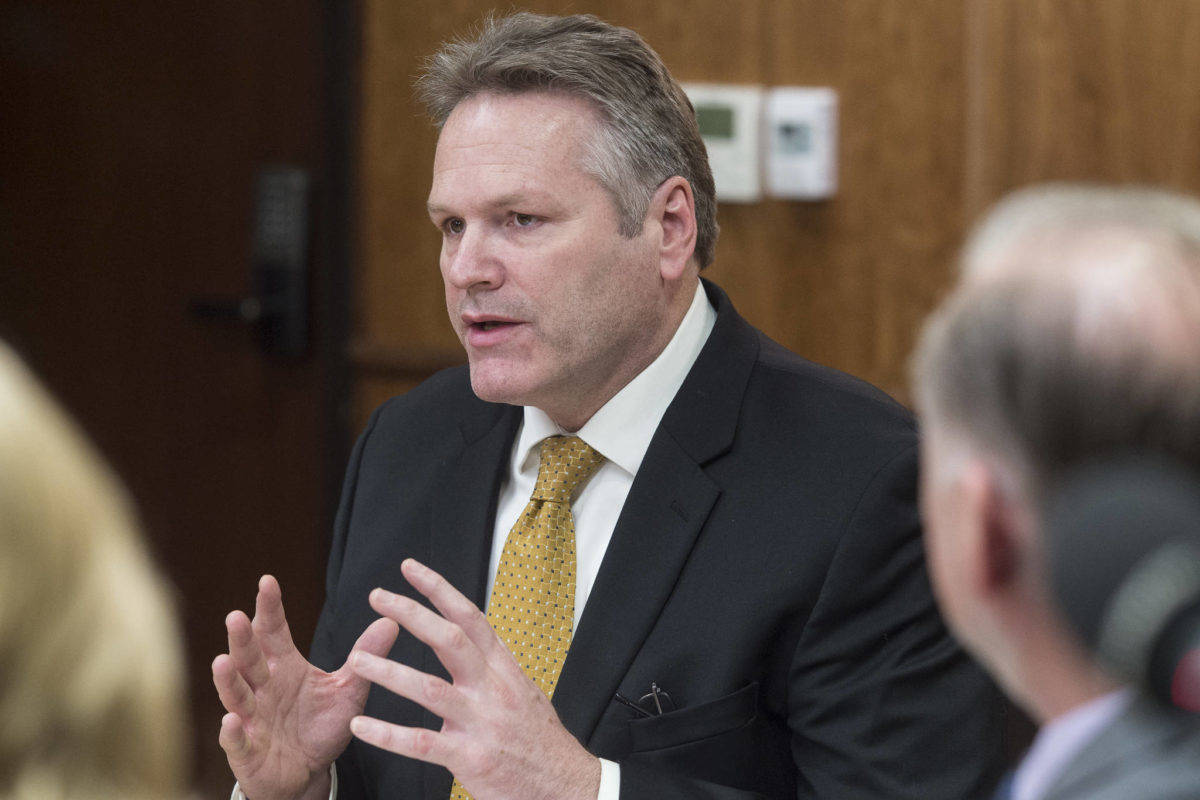Peninsula agencies could face hard decisions, if Gov. Mike Dunleavy’s proposed budget, which would cut $1.6 billion in state spending, is passed.
Documents available on the state’s Office of Management and Budget website detailed possible cuts spanning across the state.
Rep. Gary Knopp (R-Kenai/Soldotna) said he’s still in the process of dissecting the budget.
“Some things are very alarming, as I thought they would be,” Knopp said.
Knopp said he’s not happy about the budget overall. He said he supports the governor’s right to look at the budget but would prefer a more analytical approach.
“This slash and burn $1.6 billion in a year is unrealistic,” Knopp said.
Rep. Knopp said he’s concerned with the impacts to both the university and public education, which saw some of the deepest cuts.
“I imagine some campuses will close,” Knopp said.
After the governor talked of pulling $20 million in supplemental funding for districts across the state, further cuts of nearly $325 million for education and early childhood development were proposed.
The spokesperson for the Kenai Peninsula Borough School District, Pegge Erkeneff, said the proposed budget didn’t provide enough detail to accurately estimate the impact to the district. After analyzing the documents provided by the state, Erkeneff said the office couldn’t determine if the base student allocation was being reduced, or if the formula that creates the student allocations was underfunded. Either way, Erkeneff said the district has created scenarios for a number of budget possibilities.
“If passed, the district could see far greater class sizes and a reduction in staff,” Erkeneff said.
The proposed $134 million cut, or about 41 percent cut, to the University of Alaska system is the largest cut the system has been faced with. Kenai Peninsula College Director Gary Turner said the proposed budget is disappointing.
“Campus closures are on the table,” Turner said.
Excluding UAA, UAF and UAS, closing the 12 community campuses in the university system would only save the university $38 million. Turner said University of Alaska President Jim Johnsen will be looking at possible cuts in the next couple weeks. For now, Turner said it’s too early to know what’s going to happen to KPC, but he said he’s hoping for the best.
Mayor of the Kenai Peninsula Borough, Charlie Pierce, said the borough is keeping a close eye on a piece of legislation, SB 57, also put forward by the governor Wednesday. Pierce said the legislation could reduce the borough’s budget to the tune of $15 million.
“At this point, it’s very early,” Pierce said. “We are calculating and crunching the numbers to see how it will affect operating and service area budgets.”
Pierce said the borough is putting all capital expenditures on hold, while the borough works on their own budget.
SB 57 would change the way taxes are collected on oil and gas exploration, production and pipeline transportation property. Municipalities with these kinds of properties in their jurisdiction can levy a property tax based on the state’s assessment.
In a letter to Senate President Cathy Giessel, Gov. Dunleavy said the system of requiring taxpayers to pay a tax to two taxing jurisdictions — the municipality and the state is inefficient.
“Taxpayers are allowed to credit payments made to a municipality against the tax due to the state,” Dunleavy said in the letter. “Due to the credit allowed against the state tax levy for municipal tax payments, the state general fund receives only a fraction of the revenues generated by this tax. This results in lower general fund revenues, from the vital properties of statewide economic importance, to be appropriated to municipalities around the state and support vital state programs.”
In a Wednesday press release, Rep. John Lincoln (D-North Slope) said SB 57 would allow the state to collect the entirety of taxes on petroleum property, depriving municipalities and boroughs of a reliable revenue stream.
“The Fairbanks North Star Borough and the cities of Anchorage, Kenai, and Valdez have all developed budgets on the assumption that they will continue to have the authority to levy and collect taxes on petroleum-based property within their boundaries,” Lincoln wrote in his press release.
In a statement on Wednesday, Rep. Ben Carpenter (R-Nikiski) said SB 57 has the potential to impact the borough substantially.
The proposed budget also includes cuts to public health, including Medicaid and the Department of Health and Social Services. President and CEO of the Alaska State Hospital and Nursing Home Association, Becky Hultberg, said the cuts would be catastrophic to the overall health care system.
The budget cuts $271 million in state general funds for Medicaid, and over $450 million in federal funds.
“It’s hard to talk in specifics about the Kenai Peninsula specifically because there aren’t a lot of details provided in the Medicaid budget,” Hultberg said. “…It is safe to say that cuts of this magnitude will be a shock to the health care system and the overall economy. Without more detail, however, we can’t say exactly what will be impacted.”
Hultberg said the Department of Health and Social Services cuts could result in a loss of 8,000 – 10,000 jobs, the same number of jobs lost in the most recent recession.
The governor’s proposed budget still needs to be approved by the Alaska State House of Representatives.

